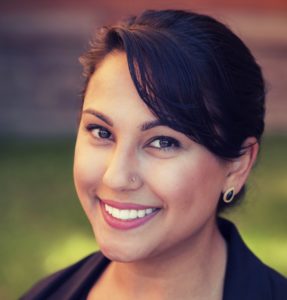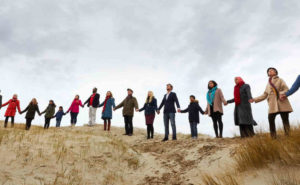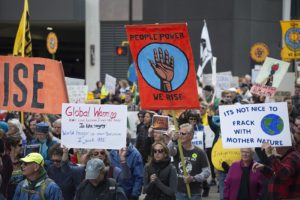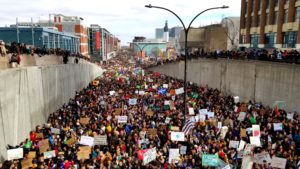How do you measure gifts of time, expertise and leadership? What indicators can you use to assess grassroots power building, organising and volunteer initiatives? This case study is part of a year long Measuring People Power project with over 500 participants from 170 global orgs that explored these questions. Find out more and get the key takeaways!
It’s September, and if you’re like me, key questions that are at the top of your mind this time of year are around measurement and evaluation. As an activist and campaigner for most of my life, when I start to think about year end, I often ask myself: this year have I deeply and broadly engaged people in meaningful action, at scale? Am I tracking the right things? What do I need to do to set campaigns next year up for success?
I know that people powered campaigns and approaches unlock enormous energy, subvert oppressive power structures, and engage people both deeply and broadly. I also know that in 2019 (and 2020) the challenges of climate destruction, the far-right, economic inequality, and exploitation are only getting bigger.
But this year, when I asked myself, my peers, colleagues, and networks about the best way to measure and track people powered action, I came up short.
Most organisations have ways to track financial contributions from supporters. But there’s a keen lack of metrics to quantify and value contributions of other kinds.
How do you measure gifts of time, expertise and leadership? What indicators can you use to assess grassroots power building, organising and volunteer initiatives?
To find out, MobLab and 13 other organisations built a massive global survey to learn how social change practitioners and leaders across the global nonprofit world currently grapple with these questions.
Advocacy campaigners and organisations are regularly finding transformative, participatory, and collaborative ways to win. But too often our hard-won lessons and approaches aren’t shared across traditional divides of geography, context and expertise.
That’s why I’d like your help.
Will you share how you measure and track people power? By “measure people power,” I mean putting into helpful numbers the contributions made by the activists, organisers, supporters, members, volunteers, social media followers, email lists, or community members who make your campaigns possible.
Ready to get involved? Click here to take the survey now. The survey is open until September 27, so there isn’t much time left!
At the end of the project, I’ll send you actionable insights, approaches, and case studies to apply to your own work.
Want to learn more about the project? Keep reading!
When did this project begin?
The survey is the latest step in a project that began early this year with an idea that people power can (and must) be measured. Over six months, MobLab consulted peers and allies, interviewed senior leaders, campaigners, activists and researchers, and reviewed the existing literature to inform this project’s strategy.
What did we learn from listening?
First and foremost, that this research is sorely needed. Decision makers and budget holders across the social change sector are recognising the need for thinking about power from a fresh perspective, but are worried that people-powered campaigning cannibalises fundraising and resource generation.
But, experience shows that it isn’t a trade-off—participation and engagement, when done well, can boost fundraising and bolsters resource generation. If we are able to measure power building and demonstrate its relationship to impact more clearly, then its value would no longer be such a point of concern.
Also, perhaps somewhat obviously, the listening process determined that impact is not the same for every organisation or campaign. Nor is every organisation or campaign working on the same issue in the same context with the same resources. The “right” thing to measure will depend on an organisation’s goals and theory of change, so any set of indicators of success that this project comes up with must be adaptable to a diversity of situations.
What research informed this project?
Power comes in many forms and has many (many) motivations.
When it comes to influencing policymakers, more contact isn’t always better. In fact, small critical masses of committed, organised, and vocal people are generally more powerful than larger, less engaged groups in creating social and policy change. The difficulty of mode of contact actually signals seriousness to policymakers, so a smaller number of high-bar authentic contacts is often better. The strength of attitudes often matters more than the breadth of (shallow) public opinion support. It follows that determining the value of people power won’t be so simple as a headcount of casual supporters.
Similarly, there are different frameworks on building collective power, social movement influence, community organising, relationship building, and leadership development that do include indicators of success.
What is not known is whether there can be straightforward measurement models for people-powered social change.
Even with the robust research out there, so many questions remain outstanding. Given diverse theories of change, inherently vague objectives, and so many other factors influencing outcomes, is it possible to surface a measurement model akin to what for-profit businesses or direct service delivery nonprofits use?
Historical research suggests it only takes 3.5% of a population taking committed action to overthrow a dictatorship. Is such a target possible for other forms of social change, in differing global contexts?
People power is built by supporters with strong relationships to organisations, movements, and each other. Is there a dollar amount we can put on volunteer or activist time? Can assign quantifiable value to the quality, depth, and networked characteristics of relationships?
These are big questions, and we all need answers.
What is the next step?
The next step is for every practitioner, leader, measurement geek, and activist possible to take the survey. It will ask about how you measure engagement, volunteering, and activism. If you’re a social change practitioner or leader who works with campaigns, participation, or engagement, please lend your insights. The survey is open until September 27th, so there isn’t much time left.
It will take all of us to find out the answers to these important burning questions. Won’t you join the effort?
We’d like to express our gratitude to our research advisors:
Hahrie Han, University of California, Santa Barbara
Dave Karpf, George Washington University
Adam Levine, Research 4 Impact
Justin Rolfe-Redding, Climate Advocacy Lab
And give a special thanks to our funders, partners, peer reviewers, and peer consults:
Becky Jarvis, OPEN Network
Elisa Ringholm, The Story of Stuff Project
Ethan Frey, Ford Foundation
Joe White, Greenpeace International
Kate Gage, The Movement Cooperative
Ledys Sanjuan Mejia, FRIDA Foundation
Louise Hazan, 350.org
Mary Joyce, DoBigGood
Molly Brooks, Greenpeace UK
Moulshri Mohan, J-PAL
Rob Mitchel, Greenpeace UK
Sarah Wilbore, 350.org
Tara Harwood, 350.org
Tom Baker, Save the Children UK
Tom Liacas, NetChange and Blueprints for Change
Zazi Dlamini, FRIDA Foundation
Top image: Photo by Patricia Serna on Unsplash




